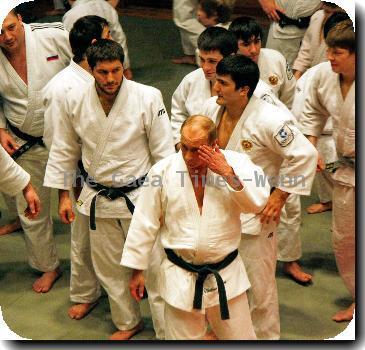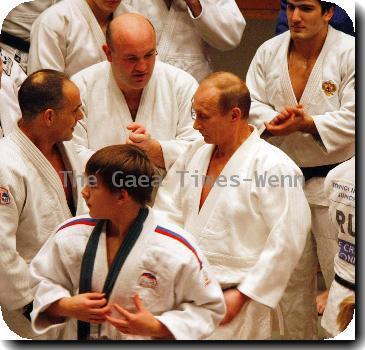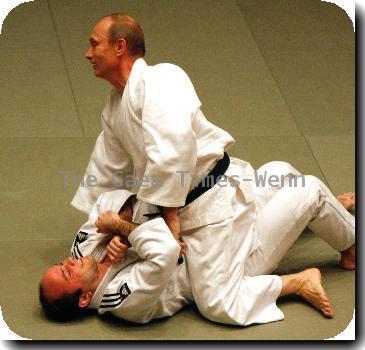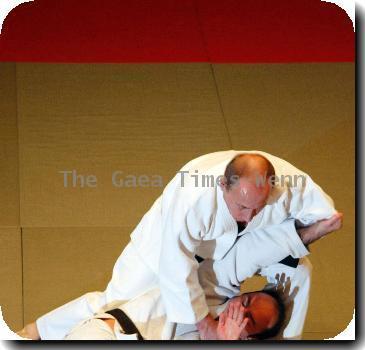Poland, a land of crucifixes, finds itself bitterly divided by a simple cross
By Vanessa Gera, APWednesday, August 18, 2010
Battle over cross reveals culture divide in Poland
WARSAW, Poland — It’s a plain wooden cross almost austere in its simplicity.
But it is stirring passions in heavily Roman Catholic Poland that expose bitter divisions which make it seem like two separate nations sharing the same land and language.
The pale wood cross about four meters (13 feet) high was erected in front of the presidential palace by Boy and Girl Scouts days after the April plane crash in Russia that killed President Lech Kaczynski, his wife and 94 others.
It quickly became a spot for mourners to light candles, place flowers and pray.
Now, with a new president installed and the country returning to normal, the question of whether the cross should stay or go has set off wider disputes that underscore the deep divisions between traditional and modern Poles, conservatives and liberals, and even rich and poor.
“The cross is a catalyst that has mobilized people who are fed up with the clericalization of Polish public life,” said Jacek Kucharczyk, president of the Institute of Public Affairs, a Warsaw think tank.
On one side are deeply nationalistic and religious supporters of the late president who want the cross to stay until a fitting memorial is built to the victims, among whom were top military brass and church leaders. Some of them cling to a conspiracy theory suggesting that Kaczynski’s domestic political rivals and Russians conspired to kill him.
On the other is an increasingly self-confident secular society that dismisses the conspiracy theory as lunacy and believes the religious symbol does not belong in front of such an important public building. This group argues that despite the country’s Catholic influence, the constitution guarantees a separation of church and state, and that the cross should move to a church.
The “defenders of the cross” — as they are commonly called — are in the minority, with just dozens of them turning out at the cross most days. Yet they have shown a tenacity that sparked a much larger counter-protest last week of thousands of mostly young Poles mobilized by a Facebook appeal.
The event took on the atmosphere of a street party, with the demonstrators playing with a plastic beach ball and even mocking their religious compatriots. One appeared at a balcony over the large crowd dressed in a pope costume — an act of irreverence rare in Poland, the native land of the much venerated late pontiff John Paul II.
“We just want the cross moved. It doesn’t belong in this place,” said Michal Buczynski, a 28-year-old economist at that rally. “I want to support a secular society. There is a vocal minority (defending the cross) and we want to push it back.”
They also returned over the following days in smaller numbers. On Sunday evening a small group of young Poles blared music from a boombox that drowned out the praying cross defenders and danced around them in a conga line. One held up a sign with an ironic appeal: “Let’s tear down the palace. It’s overshadowing the cross.”
With emotions high, each day brings a new, often disturbing development.
On Wednesday, police arrested a 60-year-old man for threatening the cross supporters with an unarmed grenade. The day before, a 71-year-old man was arrested for using feces to defile a commemorative plaque to the plane victims near the cross. The plaque was unveiled last week in an unsuccessful attempt to appease the cross defenders.
The events reveal a deep cultural shift: 20 years ago, Poland threw off communism with the help of courageous priests who challenged a regime that tried to repress religious life by promoting atheism and keeping clergy under secret police surveillance. Crosses were then reinstated in many public places in what felt like an act of liberation to many.
But today a younger generation of Poles that had no role in that struggle increasingly views the church as too powerful. John Paul’s death in 2005 was a watershed event in this shift as it deprived the country of its guiding moral authority. The late pope also put a progressive stamp on the Polish church, and with him gone the Polish church has taken a more conservative turn, alienating the young further.
An attempt by authorities on Aug. 3 to move the cross nearly sparked a riot by the cross defenders, with one woman tying herself to the cross, so authorities backed down and left it. But the scuffle raised the stakes and since then the cross defenders have camped out in front of the palace.
Over the weekend, police and other security officials removed the defenders from the cross in the middle of the night, but left the cross in place. It now stands in its spot but is barricaded behind metal barriers and police guard. It’s not clear what will happen next, but its defenders continue to gather across the street, praying and holding up small crosses and rosaries in defiance.
“Our weapon is the rosary,” said Barbara Grzegorzewska, a 50-year-old caretaker of preschool children who has joined the vigil at the cross off and on. “Poland is a Christian country and we are defending the right to have the cross in public.”
She and others, however, list many grievances when asked why they are there; from meager salaries or pensions, to fears that EU will erode the Catholic identity of their nation — making it clear that the cross has also proven a way for socially marginalized Poles to vent their frustration.
Some accuse the pro-EU government of Prime Minister Donald Tusk — a rival of Kaczynski — of selling out the country to foreigners by privatizing state industries, a project undertaken to raise money and lower a ballooning deficit. They voice frustration that Russia is leading the investigation into the crash that killed Kaczynski — and express doubts into preliminary findings that the crash was caused by heavy fog and pilot error.
“There is suspicion among us that this was an assassination,” Grzegorzewska said.
And the people who turn out to protest the cross?
“They are drug addicts and Satan worshippers — we don’t take them seriously,” she said.
The complex dispute over the cross is on one level also a political battle between Tusk’s Civic Platform, also the party of the newly elected President Bronislaw Komorowski, and its main rival, Law and Justice, the pro-church party led by Kaczynski’s twin brother Jaroslaw.
Kaczynski ran hoping to replace his brother, but lost to Komorowski in a runoff vote on July 4. He has encouraged the cross defenders by placing a wreath at the cross on the four-month anniversary of plane crash and by accusing Tusk and Russian Prime Minister Vladimir Putin of bearing “moral and political” responsibility for the crash.
Kaczynski died en route to a memorial ceremony for the victims of a World War II massacre of Poles by Soviet secret police. A couple of days earlier Tusk and Putin had attended a similar ceremony but Kaczynski was not invited.
Jaroslaw Kaczynski said last week that Tusk’s rivalry with Lech Kacyznski and the president’s exclusion from the main ceremonies with Putin put his brother in danger and increased the likelihood of disaster. He did not explain further but one of his supporters, Antoni Macierewicz, said Monday that Kaczynski’s delegation did not receive the same high security standards provided to Tusk.
Tags: Accidents, Eastern Europe, Europe, Facebook, Holidays, Occasions, Poland, Political Ethics, Political Issues, Russia, Transportation, Vladimir Putin, Warsaw



